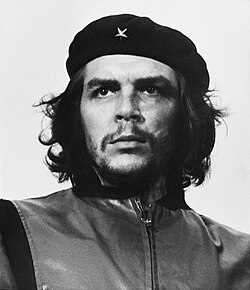|
เอร์เนสโต เกบารา (สเปน: Ernesto Guevara, ออกเสียง: [eɾˈnesto ɣ̞eˈβ̞aɾa])[a] หรือที่รู้จักกันในชื่อ เช (สเปน: Che, ออกเสียง: [t͡ʃe]; 14 มิถุนายน[1] ค.ศ. 1928 – 9 ตุลาคม ค.ศ. 1967) เป็นนักปฏิวัติลัทธิมากซ์ นายแพทย์ นักเขียน ผู้นำนักรบกองโจร นักการทูต และนักทฤษฎีการทหารชาวอาร์เจนตินา ในฐานะที่เป็นบุคคลสำคัญคนหนึ่งจากการปฏิวัติคิวบา ภาพใบหน้าของเขากลายเป็นสัญลักษณ์ที่พบทั่วไปของวัฒนธรรมต่อต้านและการกบฏ และเป็นตราต้นแบบที่รู้จักกันเป็นสากลภายในวัฒนธรรมสมัยนิยม
ประวัติ
ครั้งยังเป็นนักศึกษาแพทย์หนุ่ม เกบาราเดินทางไปทั่วทวีปอเมริกาใต้และเกิดความคิดหัวรุนแรงขึ้นเพราะความยากจนข้นแค้น ความหิวโหย และโรคภัยที่เขาพบระหว่างทาง[7] ความปรารถนาทำลายล้างสิ่งที่เขามองว่าเป็นการขูดรีดของทุนนิยมในลาตินอเมริกาผลักดันให้เขาเข้ามีส่วนเกี่ยวข้องในการปฏิรูปสังคมกัวเตมาลาภายใต้รัฐบาลฮาโกโบ กุซมัน แต่สุดท้ายประธานาธิบดีผู้นี้ก็พ้นจากตำแหน่งหลังถูกรัฐประหารซึ่งได้รับความช่วยเหลือจากซีไอเอ ตามคำขอของบริษัทยูไนเต็ดฟรูต นั่นทำให้อุดมการณ์ทางการเมืองของเกบาราแข็งแกร่งยิ่งขึ้น[7] ต่อมา ขณะอาศัยอยู่ในกรุงเม็กซิโกซิตี เขาพบกับราอุลและฟิเดล กัสโตร เข้าร่วมขบวนการ 26 กรกฎาคม และออกเดินทางสู่คิวบาโดยใช้เรือยนต์ขนาดเล็กชื่อ กรันมา ด้วยจุดประสงค์ขับไล่ผู้เผด็จการฟุลเฮนซิโอ บาติสตาซึ่งสหรัฐหนุนหลังอยู่[8] ไม่ช้าเกบาราก็ก้าวขึ้นสู่ตำแหน่งสำคัญในกองกำลังกบฏดังกล่าว ได้รับการแต่งตั้งให้เป็นรองผู้บัญชาการ และมีบทบาทสำคัญยิ่งในการทัพกองโจรซึ่งสามารถล้มระบอบบาติสตาได้สำเร็จภายในเวลาสองปี[9]
บทบาททางการเมือง
หลังการปฏิวัติคิวบา เกบารามีบทบาทสำคัญหลายอย่างในรัฐบาลใหม่ ไม่ว่าจะเป็นการร่วมพิจารณาคดีในศาลปฏิวัติ ทบทวนการอุทธรณ์และการยิงเป้าอาชญากรสงครามที่ถูกตัดสินลงโทษ[10] ริเริ่มการปฏิรูปที่ดินการเกษตรในฐานะรัฐมนตรีอุตสาหกรรม เป็นหัวหอกการรณรงค์เพื่อการรู้หนังสือทั่วประเทศซึ่งประสบผลสำเร็จ ปฏิบัติหน้าที่ผู้ว่าการธนาคารแห่งชาติและผู้อำนวยการฝึกสอนให้แก่กองทัพคิวบา และเดินทางไปทั่วโลกในฐานะผู้แทนทางทูตจากสังคมนิยมคิวบา ตำแหน่งต่าง ๆ ดังกล่าวยังทำให้เขามีหน้าที่หลักในการฝึกสอนกองกำลังอาสาสมัครซึ่งสามารถขับไล่ผู้บุกครองอ่าวหมูออกไปได้[11] และชักนำให้สหภาพโซเวียตเข้ามาติดตั้งขีปนาวุธนิวเคลียร์ในคิวบาซึ่งกระตุ้นให้เกิดวิกฤตการณ์ขีปนาวุธใน ค.ศ. 1962[12] นอกจากนี้ เขายังเป็นนักจดบันทึกและนักเขียนที่ผลิตผลงานออกมาจำนวนมาก โดยเขียนคู่มือการสงครามกองโจรต้นแบบ ร่วมกับบันทึกความทรงจำเกี่ยวกับการเดินทางไปทั่วทวีปด้วยจักรยานยนต์ในวัยหนุ่มของเขา ประสบการณ์ชีวิตและความรู้เกี่ยวกับลัทธิมากซ์-เลนินนำพาให้เขาสรุปว่าความด้อยพัฒนาและการตกอยู่ในภาวะพึ่งพาของโลกที่สามเป็นผลที่แท้จริงจากจักรวรรดินิยม ลัทธิอาณานิคมแนวใหม่ และทุนนิยมผูกขาด ทางเยียวยามีเพียงทางเดียวคือการใช้แนวคิดสากลนิยมของชั้นชนกรรมาชีพและการปฏิวัติโลก[13][14] เกบาราออกจากคิวบาใน ค.ศ. 1965 เพื่อก่อการปฏิวัติคอมมิวนิสต์ในประเทศอื่น ครั้งแรกในคองโก-กินชาซาแต่ไม่ประสบความสำเร็จ และครั้งต่อมาในโบลิเวีย ที่นี่เขาถูกกองทัพโบลิเวียซึ่งมีซีไอเอสนับสนุนอยู่จับ และถูกประหารชีวิตโดยไม่ผ่านกระบวนการยุติธรรม[15]
ภาพลักษณ์
เกบาราเป็นบุคคลทางประวัติศาสตร์ที่ได้รับทั้งเสียงยกย่องและเสียงประณาม มุมมองต่าง ๆ เกี่ยวกับตัวเขาได้รับการรวบรวมไว้ในจินตนาการร่วมในรูปของสื่อจำนวนมาก ไม่ว่าจะเป็นหนังสือชีวประวัติ บันทึกความทรงจำ ความเรียง สารคดี เพลง หรือภาพยนตร์ เนื่องจากการยอมสละชีพเพื่อความเชื่อของเขา การปลุกเร้าด้วยบทกวีเพื่อให้เกิดการต่อสู้ระหว่างชนชั้น และความปรารถนาที่จะสร้างความสำนึกของการเป็น "คนใหม่" ซึ่งขับเคลื่อนด้วยจริยธรรมแทนที่จะเป็นสิ่งจูงใจทางวัตถุ เกบาราจึงกลายมาเป็นบุคคลสัญลักษณ์ที่สมบูรณ์แบบของขบวนการทางการเมืองต่าง ๆ ที่นิยมฝ่ายซ้าย เขาได้รับเลือกจากนิตยสารไทม์ให้เป็น 1 ใน 100 บุคคลผู้ทรงอิทธิพลที่สุดในคริสต์ศตวรรษที่ 20[16] ส่วนภาพถ่ายของเขาที่มีชื่อว่า นักรบกองโจรผู้เป็นวีรบุรุษ (Guerrillero Heroico) และถ่ายโดยอัลเบร์โต กอร์ดา ก็ได้รับการยกย่องจากสถาบันวิทยาลัยศิลปะแมริแลนด์ว่าเป็น "ภาพถ่ายที่มีชื่อเสียงที่สุดในโลก"[17]
เชิงอรรถ
- ↑ ในระบบเสียงภาษาสเปนทั้งในยุโรปและลาตินอเมริกาโดยทั่วไปไม่ปรากฏหน่วยเสียง /v/ (ตรงกับเสียงของตัวอักษร v ในภาษาอังกฤษ) เพราะตัวอักษร b และ v แทนหน่วยเสียงเดียวกันคือ /b/ ซึ่งในการออกเสียงจริงอาจแปรเป็นเสียงกัก ริมฝีปาก ก้อง [b] หรือเสียงเปิด ริมฝีปาก ก้อง [β̞] ก็ได้ขึ้นอยู่กับตำแหน่งภายในคำและในประโยค รวมทั้งความระมัดระวังในการเปล่งเสียงของผู้พูด อนึ่ง เสียง [β̞] นี้เป็นเสียงที่ฟังดูคล้ายกับเสียง [v] หรือ [w] สำหรับหูคนไทยหลายคน แต่ความจริงไม่ใช่ทั้งคู่
อ้างอิง
- ↑ 1.0 1.1 The date of birth recorded on his birth certificate was June 14, 1928, although one tertiary source, (Julia Constenla, quoted by Jon Lee Anderson), asserts that he was actually born on May 14 of that year. Constenla alleges that she was told by Che's mother, Celia de la Serna, that she was already pregnant when she and Ernesto Guevara Lynch were married and that the date on the birth certificate of their son was forged to make it appear that he was born a month later than the actual date to avoid scandal. (Anderson 1997, pp. 3, 769.)
- ↑ Partido Unido de la Revolución Socialista de Cuba, aka PURSC.
- ↑ 3.0 3.1 Unknown, Autor. "Guevara, Che". Encyclopædia Britannica Online. คลังข้อมูลเก่าเก็บจากแหล่งเดิมเมื่อ 2022-05-05. สืบค้นเมื่อ 30 September 2001.
- ↑ The Spark That Does Not Die by Michael Löwy, International Viewpoint, July 1997
- ↑ McLaren 2000, p. 78.
- ↑ Embodiment and Agency, by Sue Campbell & Letitia Meynell, Penn State Press, 2009, ISBN 0-271-03522-6, p. 243
- ↑ 7.0 7.1 On Revolutionary Medicine Speech by Che Guevara to the Cuban Militia on August 19, 1960. "Because of the circumstances in which I traveled, first as a student and later as a doctor, I came into close contact with poverty, hunger and disease; with the inability to treat a child because of lack of money; with the stupefaction provoked by the continual hunger and punishment, to the point that a father can accept the loss of a son as an unimportant accident, as occurs often in the downtrodden classes of our American homeland. And I began to realize at that time that there were things that were almost as important to me as becoming a famous or making a significant contribution to medical science: I wanted to help those people."
- ↑ Beaubien, NPR Audio Report, 2009, 00:09–00:13.
- ↑ "Castro's Brain" 1960.
- ↑ Taibo 1999, p. 267.
- ↑ Kellner 1989, pp. 69–70.
- ↑ Anderson 1997, pp. 526–530.
- ↑ "On Development" Speech delivered by Che Guevara at the plenary session of the United Nations Conference on Trade and Development in Geneva, Switzerland on March 25, 1964. "The inflow of capital from the developed countries is the prerequisite for the establishment of economic dependence. This inflow takes various forms: loans granted on onerous terms; investments that place a given country in the power of the investors; almost total technological subordination of the dependent country to the developed country; control of a country's foreign trade by the big international monopolies; and in extreme cases, the use of force as an economic weapon in support of the other forms of exploitation."
- ↑ At the Afro-Asian Conference in Algeria A speech by Che Guevara to the Second Economic Seminar of Afro-Asian Solidarity in Algiers, Algeria on February 24, 1965."The struggle against imperialism, for liberation from colonial or neocolonial shackles, which is being carried out by means of political weapons, arms, or a combination of the two, is not separate from the struggle against backwardness and poverty. Both are stages on the same road leading toward the creation of a new society of justice and plenty." ... "Ever since monopoly capital took over the world, it has kept the greater part of humanity in poverty, dividing all the profits among the group of the most powerful countries. The standard of living in those countries is based on the extreme poverty of our countries. To raise the living standards of the underdeveloped nations, therefore, we must fight against imperialism." ... "The practice of proletarian internationalism is not only a duty for the peoples struggling for a better future, it is also an inescapable necessity."
- ↑ Ryan 1998, p. 4.
- ↑ Dorfman 1999.
- ↑ Maryland Institute of Art, referenced at BBC News May 26, 2001.
แหล่งข้อมูลอื่น
|

